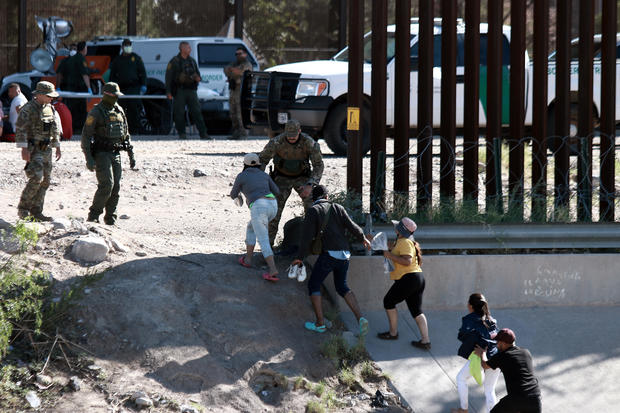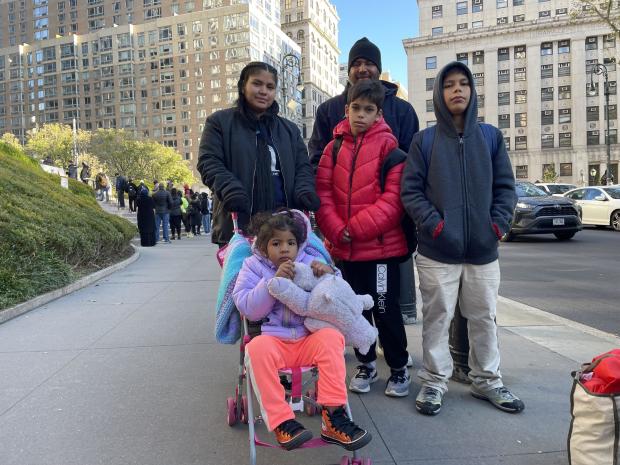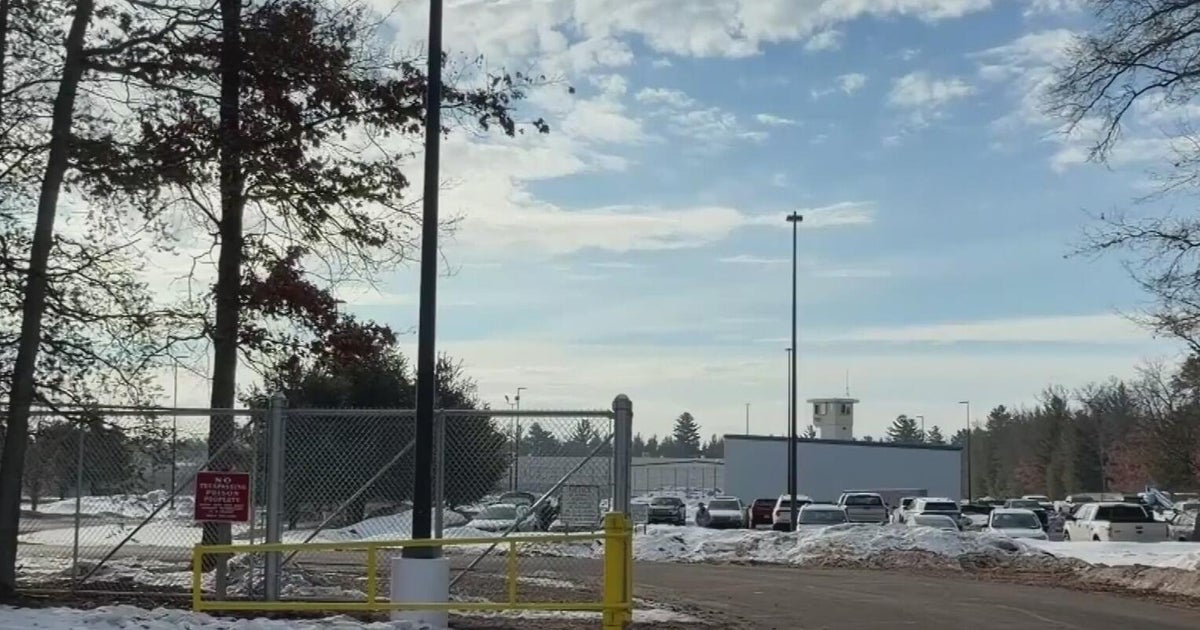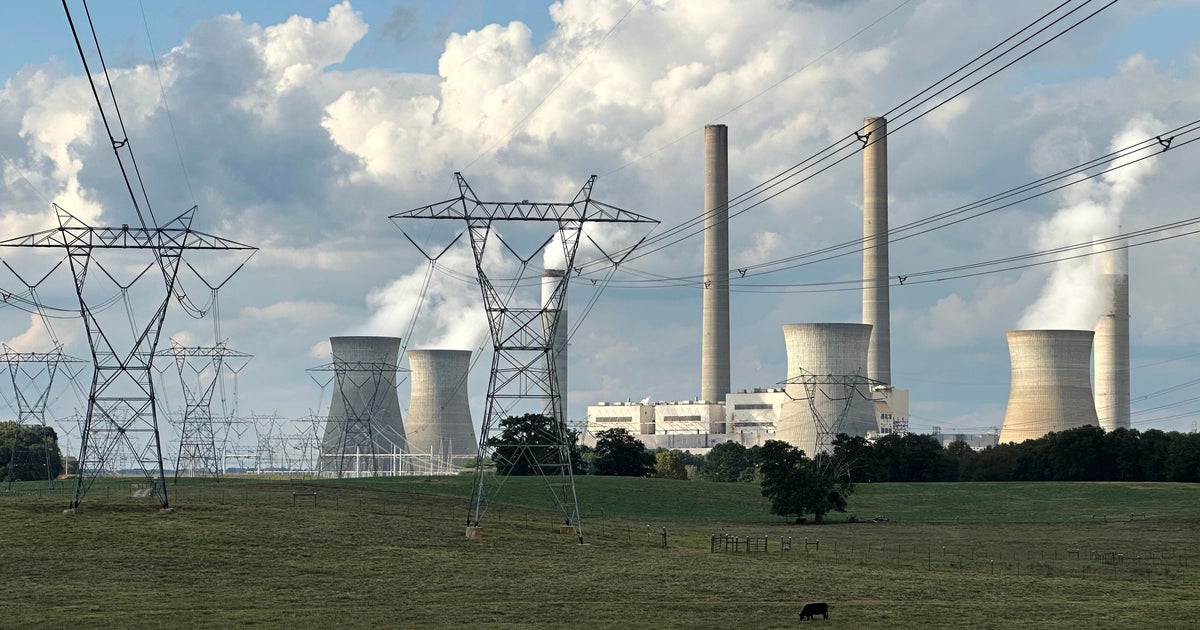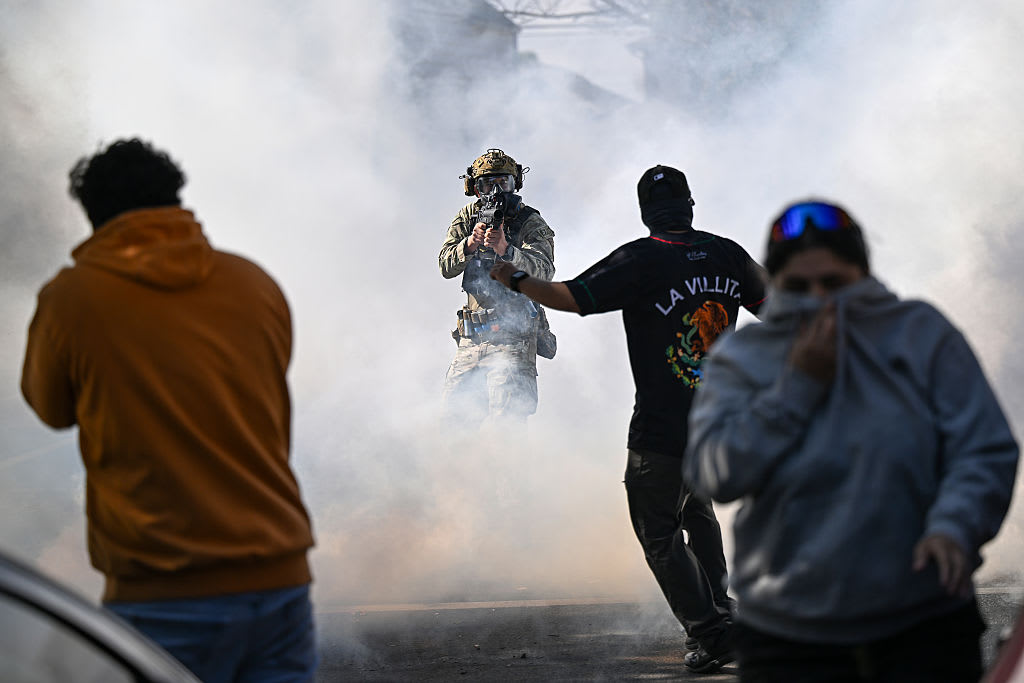Migrants hoping to seek U.S. asylum face years-long legal limbo in overwhelmed system
New York — Beberlyn and her family boarded the subway to downtown Manhattan before 4 a.m. in mid-October. Their appointment with federal immigration officials wasn't until 9 o'clock, but she wanted to make sure her family would be seen.
When the family arrived at 4:40, dozens of migrants were already waiting outside the U.S. Immigration and Customs Enforcement (ICE) office at Federal Plaza. By 8 o'clock, lines with hundreds of migrants had formed. It's a scene that repeats itself on every weekday in New York City, one of the top destinations for the hundreds of thousands of migrants released from federal U.S. border custody over the past year.
Beberlyn, 33, is a Venezuelan migrant who crossed the U.S. southern border unlawfully with her husband, 15-year-old nephew, 12-year-old son and 4-year-old daughter in late August. She was hoping ICE would give them an immigration court date so they could start the process of applying for asylum and work permits.
In fiscal year 2022, nearly 380,000 migrants like Beberlyn were released by U.S. border officials under a humanitarian authority known as parole and instructed to check in at ICE offices across the U.S. to receive a court date, government data show. It's a policy the Biden administration began last year to process migrants more quickly out of Border Patrol holding facilities, since issuing court notices is a lengthier process.
But after their hours-long wait in Manhattan, Beberlyn's family was not given a court date. Instead, they were instructed to check in with ICE again on April 1, 2024. The family is now in limbo. The U.S. allowed them to stay in the country pending the resolution of their cases. But their parole expired on Oct. 26 and because they're not in formal deportation proceedings in court, they cannot ask a judge for asylum or request work permits.
"We came here with the illusion of getting ahead, of working," said Beberlyn, whose surname is being withheld because of her pending immigration case. "I want to work. My husband wants to work. It has not been as easy as we thought. It's a bit frustrating and difficult."
Beberlyn and her family's predicament has become increasingly common for migrants seeking asylum in the U.S. Formally set up in 1980 to grant refuge to those fleeing persecution, the U.S. asylum program has come under severe strain over the past few years amid record numbers of migrants seeking protection along the southern border and Congress' failure to update the system in over two decades.
Approximately 600 judges are currently overseeing nearly 2 million unresolved cases, including 750,000 asylum applications, in the U.S. immigration court system, according to government data compiled by Syracuse University's TRAC program. These numbers don't include migrants like Beberlyn who have yet to receive a court hearing in the first place.
Due to the massive and mounting case backlog, migrants wait an average of 4.2 years for a hearing before an immigration judge, whose decisions can be appealed. Because U.S. law only allows asylum-seekers to receive work permits 180 days after an asylum petition is filed, they also typically wait years to have the chance to work in the country legally, or are forced to work illegally and get paid under the table.
The woes faced by the U.S. asylum system have intensified under the Biden administration, which has reported record levels of encounters with migrants along the U.S.-Mexico border. Tens of thousands of migrants have come from countries like Cuba, Venezuela and Nicaragua, where the U.S. cannot expel border-crossers under a pandemic-era rule that is being used to quickly turn back Mexican and Central American migrants.
In fiscal year 2022, U.S. border authorities recorded over 2.3 million encounters with migrants, a record high, though a significant percentage included repeat crossings by the same individuals. While over 1 million of those encounters resulted in expulsions under the pandemic restriction known as Title 42, U.S. border officials processed 1.3 million migrants under U.S. immigration law, which allows them to request asylum.
Theresa Cardinal Brown, a former immigration adviser in the George W. Bush and Obama administrations, said the current state of the asylum system hurts migrants by trapping them in a years-long legal limbo. It also prevents the U.S., she added, from determining whether someone qualifies for asylum promptly, a dynamic that can encourage migrants with weak or nonexistent claims to use the system to stay in the country.
"It's processing people into an ever-growing backlog of a system," said Cardinal Brown, who now works as a managing director at the Bipartisan Policy Center. "The asylum system has collapsed."
A Biden administration border policy designed to weed out weak asylum claims has shown signs of success, rejecting 50% of asylum-seekers at the initial screening phase and granting asylum to eligible migrants within months instead of years. But the program has been implemented on a very limited scale since launching in June.
"A very long process"
Beberlyn said her family's migration journey started in 2016, after her sister was killed by paramilitaries in the state of Táchira. Her family, including her sister's son, migrated to Colombia, becoming part of a mass exodus of Venezuelans that recently surpassed 7 million refugees, the largest displacement crisis recorded in the Western Hemisphere.
After living in Colombia for several years, Beberlyn said her family was again uprooted earlier this year after she filed a police complaint against a man she said sexually abused her son and nephew. Beberlyn said she was told her family would be harmed if they didn't flee: "We only had 24 hours to leave Colombia."
Like tens of thousands of Venezuelans who have journeyed north over the past year, Beberlyn's family traversed seven Latin American countries and crossed the notorious ungoverned jungle in Panama known as the Darién Gap on foot en route to the U.S. southern border.
"Our bodies were exhausted. Our feet were swollen. Four of my husband's toenails fell off; two of my toenails fell off, too," she said, recounting the trek through the jungle.
But Beberlyn said the arduous trek "was worth it."
"Now I feel calm. I feel safe," she added. "I don't have to worry about my children's safety."
The tight-knit Venezuelan family is now living in one of dozens of hotels that New York City officials have converted into makeshift shelters for migrants bused to Manhattan by Republican officials in Texas and El Paso's Democratic government. The family has also received donated winter clothes.
Beberlyn's daughter, Laidy, was enrolled in kindergarten at a public school in the Upper West Side where her son, Emmanuel, is going to middle school. Her nephew, Daiberth, who she treats as her own child, is also attending a public high school in Manhattan.
Still, the family has faced some challenges in New York. Beberlyn's husband, Melkin, said he worked on a construction project for over two weeks, but was only paid for three days. Because Melkin does not have legal status, he said, there's not much he can do about it.
While some Democrats and advocates say that allowing asylum-seekers to work legally earlier in the immigration process would curb labor theft and benefit the U.S. economy, detractors argue it would encourage more illegal immigration.
On their way back from their ICE check-in in October, Daiberth helped carry Laidy's stroller and showcased some of the words in English he had learned in school. He said he wanted to be "big" to play basketball in school. Emmanuel, meanwhile, said he was looking forward to seeing snow for the first time this winter.
Beberlyn said her children will learn English much faster than she will. But she's worried about their immigration case. They don't know when they'll receive a court date. She and her husband can't work legally. The family also does not have a lawyer, which data show could increase their chances of winning asylum.
If an immigration judge determines the family did not suffer persecution or does not have a well-founded fear of persecution based on their race, nationality, religion, political views or membership in a social group — the requirements under U.S. law — they could be ordered deported.
"I have a good chance," Beberlyn said, citing the threats against her family. "But I've heard it can take a long time, even years. It's a very long process, so we have to wait."

